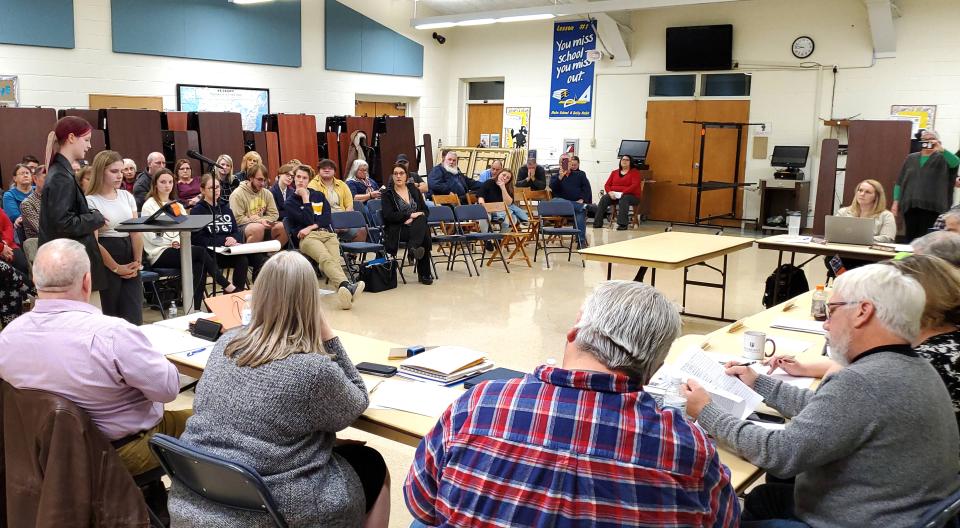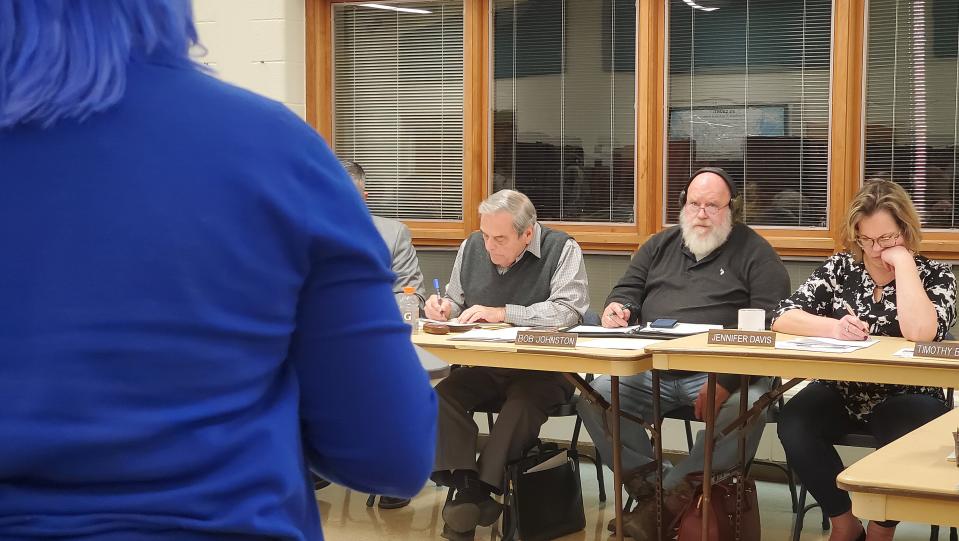Penncrest board enacts book ban with one policy, targets transgender athletes with another
SAEGERTOWN — The Penncrest School Board on Thursday not only approved a policy change that will ban books with sexually-explicit content, including material with LGBTQ themes, from its libraries, it also subtly barred transgender female athletes from competing among their cisgender peers.
By a 7-1 vote, the board approved a slight change to the district's interscholastic athletics policy by adding the words "biological (at birth)" before the word "male" in two instances. Board member Theresa Croll voted against the policy change and board member Jeff Brooks was absent.
Earlier: Penncrest board poised to ban some books from school libraries
The policy change does not explicitly state transgender females cannot participate in girls athletics, but Board President Luigi DeFrancesco confirmed that the change has such an effect.
DeFrancesco noted that the policy would prohibit any person born as a biological male from participating in a girls athletic program, but would not prevent any person who is either biologically born female or who identifies as female as their gender identity for playing boys sports. DeFranceso believes the distinction both protects female athletes from being at a "competitive disadvantage" and the district from violating the provisions of Title IX, which among other things granted equal opportunity to both males and females to participate in sports.

"The policy is to prevent discrimination against females," he said, adding that biologically born males who now identify as female and want to participate as females are "trying to avoid Title IX."
DeFrancesco said he knows of no instances in the Penncrest School District in which the issue has arisen, but added "the day is going to come."
Asked how the district might make such a determination if a student-athlete's gender were challenged, DeFrancesco first said, "Sometimes it's very simple. They stand next to each other and you can tell easily." When asked if such a process might pose legal issues around privacy and discrimination, DeFrancesco clarified himself and said the district would likely ask for a student's birth certificate.
'Under the radar'
Eli Skelton, a 21-year-old transgender resident of Cussewago Township, Crawford County, has attended recent school board meetings to object to both policy changes. Skelton attended Cambridge Springs Elementary School through eighth grade, but transferred to the PA Cyber Charter School in ninth grade. Skelton, who came out as transgender at age 15, graduated in 2020.
"The way that the school board worded it, it seemed more like they were trying to get it passed without saying it outright, without using the wording of 'transgender youth will not be able to participate in the sport that matches their gender,'" Skelton said. "They added the wording of 'biological (at birth)' in front of 'male' and 'female.' And that was basically how they tried to get it (passed) under the radar so that it wouldn't be seen as them being transphobic."
More:Science or fear? No one agrees on reason for restricting transgender athletes
Skelton said the idea that transgender females have a competitive advantage playing girls sports is a deeply flawed argument because it does not take into consideration that teens are often not finished going through puberty until their late teens and don't stop growing until their late teens or early 20s. It also does not consider the effects that hormone replacement therapy or hormone blockers play in transgender athletes' development, he said.
Skelton noted that despite the subtle wording, "it is obvious to us" in the LGBTQ community who have been following these types of proposed bans what the intent is.
He added that he's not done fighting the issue and believes that civil rights groups like the American Civil Liberties Union will challenge such policies.
The Hempfield School District in July became the first public school district in Pennsylvania to pass such a ban. The Republican majorities in both the Pennsylvania House and Senate passed a similar ban last year, but it was vetoed by Gov. Tom Wolf, who called it discriminatory.
Skelton has also spoken in opposition to the board's new library policy, which was passed by a 5-3 vote Thursday.
The board enacted new language under the heading "Avoiding Inappropriate Materials" to its library materials policy. The new language prohibits any material with explicitly written, visual or visually implied depictions of sexual acts or simulations of such acts, as well as visual depictions of nudity with the exception of anatomical diagrams and classical works of art.
DeFrancesco, and board members David Valesky, Amber Tyson Wright, Robert Johnston and Fred Bryant, voted in favor of the policy. Board members Jennifer Davis, Tim Brown and Theresa Croll voted against it. The board's ninth member, Jeff Brooks, who had previously come out in opposition to the change, was not in attendance for Thursday's vote.
DeFrancesco said the board does not have plans to review all materials in the district's school libraries, but it has an established policy that allows parents or others to challenge the appropriateness of such materials. The policy, he added, will primarily assist the district in its purchasing of new materials.
"All of the previous books in the libraries have been approved by the board," he noted.
He rejected the idea that the policy was taking aim at the LGBTQ community and said literature about LGBTQ issues without visual or written descriptions of sexual acts would continue to be permitted in district libraries.
However, DeFrancesco said he feared that some of the existing material could be considered "pornographic" and therefore in violation of state and federal laws, which could put district officials at risk. Before voting on the new policy Thursday, board members amended the proposal to include a footnote that referred to a section of federal obscenity laws involving minors.
Proponents have expressed outrage that there are books that include descriptions of sexual intercourse and other adult themes.
Penncrest students and others who opposed the ban said it disproportionately targets literature for the LGBTQ community and therefore violates students' rights.
Others have argued that the policy could lead to unintended consequences, including removal of the Bible. They said that the current policy still allowed parents to notify the district of any materials they don't want their children to read or view.
On Monday, the Philadelphia-based Foundation for Individual Rights and Expression wrote a letter to the board urging members to reconsider the policy, calling it "overbroad" and saying it "threatened to diminish the educational value of" Penncrest's libraries.
"The proposed changes to Penncrest’s library materials policy undermine the libraries’ function as a space where students can voluntarily continue their educational journeys outside classroom," the nonprofit, nonpartisan group wrote in a four-page letter. "The proposed revisions are not closely tailored to advancing Penncrest’s interest in making age-appropriate content available for students, and instead exclude a large number of works that would undoubtedly have lasting educational value for many students."

'Inexcusable'
It's the second change made to the policy in the past year. The board in July added new language after Valesky objected to a resource list that included books dealing with racial issues, including four books that he said "openly promote" the social justice group Black Lives Matter, which he referred to as a "hate group," according to the Meadville Tribune.
While the change in the athletic policy clearly targets transgender students, Skelton said, the library policy affects all minority students, not just those in the LGBTQ community.
"Their last amendment to their previous policy was another way for them to try to get books out (of the libraries) that were proving that racism is an actual thing," he said. "Now, they're trying to take away books that show students things that are actually happening in their lives, like sexual assaults, mental illness, chronic illness and things such as xenophobia, racism, and all of the different forms of abuse."
The policies were crafted by Valesky, chairman of board's policy committee, who has raised such issues in the past. In May 2021, he called a Pride Month display in the Maplewood Junior-Senior High School "totally evil" and last May, when he successfully sought to remove from a list of resources a presentation by a transgender person and, at the time, a political candidate, whom Valesky repeatedly misgendered.
Valesky, in an email, said he proposed the library policy "because I care about our future generation.
"Our job is to provide the best possible education to students," he wrote. "Noah Webster’s 1828 dictionary defines Educate as this, 'To bring up, as a child; to instruct; to inform and enlighten the understanding; to instill into the mind principles of arts, science, morals, religion and behavior.' My goal is to make sure we keep this our priority. Our founding fathers believed that teaching morality was an important part of education."
Valesky, according to the Saegertown Panther Press, the student newspaper of Saegertown Junior-Senior High School, had presented a list of 11 titles he found in the district's three high school libraries that contained content he called "garbage" at the board's Dec. 8 meeting, when the policy change was given a first reading.
"Pornographic materials on the taxpayers' dime is inexcusable," Valesky wrote in his statement to the Erie Times-News.
There is no evidence that any of the materials meet a legal definition of pornography.
https://twitter.com/jodipicoult/status/1487121725661843456
Popular author Jodi Picoult, whose book "Nineteen Minutes" has found itself on other book ban lists across the country, was among the titles Valesky had listed.
A year ago, Picoult responded on Twitter to allegations that her book, which is about a school shooting, contained pornographic material.
"The reason 19 Minutes is banned? Because there's a scene of date rape in it, which is completely necessary to the overall theme of bullying. Anyone who thin(k)s date rape is porn has a LOT of therapy to do," Picoult wrote.
Matthew Rink can be reached at mrink@timesnews.com or on Twitter at @ETNRink.
This article originally appeared on Erie Times-News: Penncrest board OKs book ban, policy targeting transgender athletes

